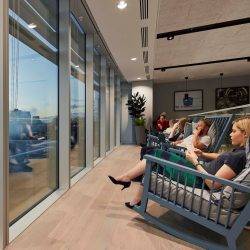January 26, 2017
Global workforce fears it won’t adapt fast enough to the digital workplace 0
 Workers across the globe are excited by the potential for technology to enhance their work lives and create new career opportunities, but over a third (40 percent) fear that they won’t be able to keep up with the rate of change required by digital business, claims a new survey. Across Europe 77 percent of workers acknowledge that disruption and increased competition will require more people with digital skills in order to compete on a global scale; however, the level of encouragement employees believe they are currently receiving to drive change in the workplace varies greatly throughout the world. Only 64 percent of respondents in the US saying they feel empowered by their company culture to lead innovation, whereas 90 percent of employees in Mexico feel their workplaces encourages them to drive change. The BMC study of over 3,200 office workers in 12 countries worldwide found that 88 percent of office workers across the world strongly believe that employers must create an innovative culture to retain staff and enable them to be successful with increasingly digital roles and responsibilities.
Workers across the globe are excited by the potential for technology to enhance their work lives and create new career opportunities, but over a third (40 percent) fear that they won’t be able to keep up with the rate of change required by digital business, claims a new survey. Across Europe 77 percent of workers acknowledge that disruption and increased competition will require more people with digital skills in order to compete on a global scale; however, the level of encouragement employees believe they are currently receiving to drive change in the workplace varies greatly throughout the world. Only 64 percent of respondents in the US saying they feel empowered by their company culture to lead innovation, whereas 90 percent of employees in Mexico feel their workplaces encourages them to drive change. The BMC study of over 3,200 office workers in 12 countries worldwide found that 88 percent of office workers across the world strongly believe that employers must create an innovative culture to retain staff and enable them to be successful with increasingly digital roles and responsibilities.













 Amos Tversky and Daniel Kahneman introduced the concept of Loss Aversion in 1984, highlighting people’s tendency to strongly prefer avoiding losses to acquiring gains. Most studies suggest that losses are twice as powerful, psychologically, as gains. Lose £100 and we will feel a remorse that easily outweighs winning £100. In a similar fashion we find it very hard to see future positives when confronted with short term loses. We understand easily what we have lost but cannot imagine what there is to be gained. Furthermore, as Frederic Bastiat wrote in an 1850 paper, “That Which is Seen, and That Which is Not Seen”, man has a tendency to “pursue a small present good, which will be followed by a great evil to come, rather than a great good to come, at the risk of a small present evil”. Put these together and it is no wonder that, by and large, the future of work, corporate real estate and the workplace is so widely misunderstood.
Amos Tversky and Daniel Kahneman introduced the concept of Loss Aversion in 1984, highlighting people’s tendency to strongly prefer avoiding losses to acquiring gains. Most studies suggest that losses are twice as powerful, psychologically, as gains. Lose £100 and we will feel a remorse that easily outweighs winning £100. In a similar fashion we find it very hard to see future positives when confronted with short term loses. We understand easily what we have lost but cannot imagine what there is to be gained. Furthermore, as Frederic Bastiat wrote in an 1850 paper, “That Which is Seen, and That Which is Not Seen”, man has a tendency to “pursue a small present good, which will be followed by a great evil to come, rather than a great good to come, at the risk of a small present evil”. Put these together and it is no wonder that, by and large, the future of work, corporate real estate and the workplace is so widely misunderstood.



















